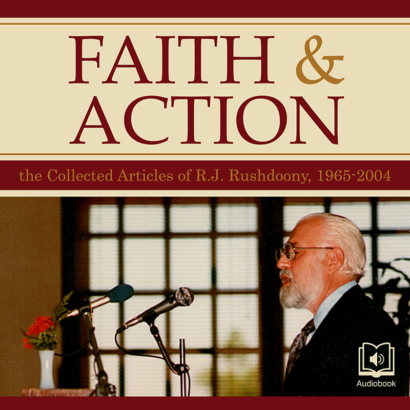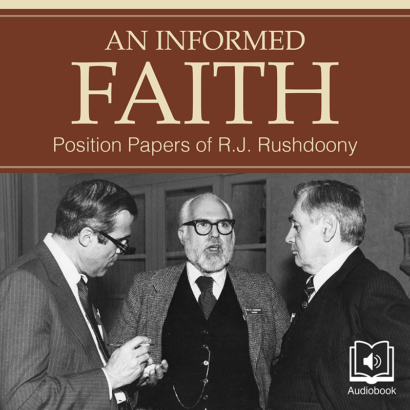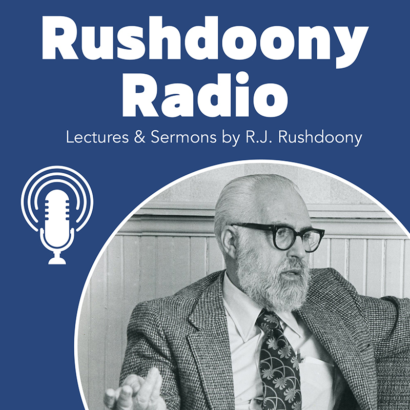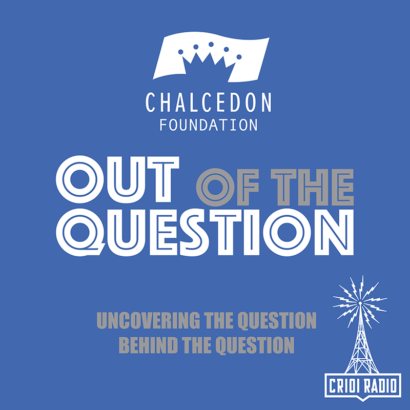
J is for Justified
• Apr, 15 2024
In this thought-provoking episode of "Preschool Pioneers," titled "J is for Justified: How Mankind is Addicted to Justifying Evil and Demonizing Good," host Jeremy Walker explores the pervasive human tendency to rationalize one's own morally questionable actions while criticizing others'. Drawing from biblical verses and contemporary social issues, Walker discusses how from a young age, individuals are conditioned to believe in their own moral infallibility. This episode challenges listeners to reconsider their perspectives, emphasizing the importance of Christian teachings and the necessity of holding oneself accountable to a higher ethical standard to combat societal norms of self-justification. Walker advocates for education that aligns with divine laws, encouraging a shift towards a community that values true moral integrity.
Hosted by
Husband, Father, Pastor, Teacher, Podcaster, and Christian Education Advocate
- Series: Preschool Pioneers
- Topics:
Jeremy Walker (00:15):
And welcome back to another episode of Preschool Pioneers. I'm your host, Jeremy Walker. You can follow us on our parent network, CR101 radio, on social media such as Facebook, Twitter, Gab, and YouTube. And you can subscribe to this podcast in your preferred platform. To never miss an episode, visit cr101radio.com for these links.
(00:38):
Okay. Welcome back, my friends, to another episode of Preschool Pioneers. This episode is entitled J is for Justified: How Mankind is Addicted to Justifying Evil and Demonizing Good. I want to start this episode with three different Bible verses, Proverbs 12:15, Proverbs 16:2, and Proverbs 21:2. Let's start with Proverbs 12:15, "The way of a fool is right in his own eyes, but he that hearkeneth unto counsel is wise. Proverbs 16:2, "All the ways of a man are clean in his own eyes, but the Lord weigheth the spirits." And Proverbs 21:2, "Every way of a man is right in his own eyes, but the Lord pondereth the hearts."
(01:48):
On this episode, I want to discuss the concept and the proclivity, nay, the addiction that natural man has, and even the new creation, the Christian, to justify evil at times and especially demonizing good. And it all flows from the concept that we were just talking about. You are right, you're convinced you're right, and everything you do is right. It's justified. If somebody does something to you, like little children, this of course is talking about parents and teachers, Christian education schools and preschools, and little children in particular are always justified in their actions. Everything they do is righteous. "Why did I hurt somebody? It's because you did something to me." Or you might hear a child say, "Well, they did it first."
(02:47):
The same thing sticks with us all throughout our lives. The main problem we have is that our moral compass is ourselves. From the time that a child is born and comes from the womb, they are convinced that their moral compass is correct. Why? Because it's theirs. This is the original sin from Genesis 3 where mankind wanted to be the determiner of good and evil for himself. And wouldn't you know it? Good is defined as anything that the man or the person, the individual, does or thinks or wants to do, and everything evil is what other people that think or want to do or their actions that are contrary to theirs. This is the most basic problem with mankind, our ability to justify ourselves and condemn others. We are addicted, absolutely addicted, to justifying evil, specifically our own, and demonizing the good. And the good would be those things we see in other people.
(04:04):
I want to go over a few things here and talk about how the world sees this concept, and then I want to discuss a few other things about some justifications we might have. And as parents and as teachers, specifically Christian teachers or a Christian school, you are going to need to learn how to act in the real world. And the real world is just what I said. They justify everything they do because what they do is right, and anything that you might do that is contrary to that is absolutely wrong. They don't have a basis that's built on God's commandments. It's built on them, their personal preferences, their organization, their institution, their civil government, whatever it might be, their bureaucracy. Whatever it is, it's based on that. And that is where the concept of right and wrong comes from. Justification and condemnation both come from that set of roles.
(05:11):
I want to touch on some current events that are popping through, and this will kind of give you an idea of how the world can justify itself in a couple of different highlighted ways, I guess is a good word for it, highlighted ways. Some of the most recent, I guess, media cases, one of them being at least this week that I heard of was a young Black man by the name of Dexter Reed. He's being pulled over by the police. And when he did get pulled over, and the story is never complete, you always get a portion of the story, but Dexter Reed decided to open fire on police with a handgun. Reports say he fired 11 bullets. Then all the police officers that were there obviously of course opened fire in return on this young man, and of course he lost his life.
(06:02):
People then were of course demonizing the police, saying that this young man was just gunned down while he was in his car because of the color of his skin, and therefore he was justified and they were not. Somehow, people could justify a young man opening fire on police for something as silly and simple as being pulled over by the police. Well, perhaps we don't need to demonize the police who are being open fired upon. Are the police now supposed to say, "Well, if you open fire upon us and try to murder us, that we are not going to return fire"? We're just going to let you do it because you are justified. After all, you are allowed to shoot at police officers with no consequence.
(06:51):
There was another case of a man in the news who was guilty and being arraigned for rape of a woman. And whenever they're asking him the reasonings behind this, well, you can guess it. It was because of slavery. See, he being a Black man and her being a white woman, this was a justified rape for kind of payment for slavery that he did not participate in nor she participate or their descendants. But this was the justification for such things.
(07:24):
You had the OJ Simpson trial, which was recently in the news again because he recently passed away, and the verdict. And what did they say about OJ Simpson? Not guilty. He was justified. The jurors even came out years later and were saying that, "We knew that every piece of evidence pointed to his guilt, but we believe that he should be not guilty justified in murdering two people." Why? Because he was a Black man and they were two white people. And after all, don't you know in the times, this is when in LA, Rodney King had been pulled over and beaten to death by the police department then. And since they did not get justice or the people of his kind did not get justice, therefore this was a way to get back and make things right.
(08:24):
We've had over the last couple of years rioting in streets, burning down city blocks, stealing things from stores where stores in various cities around the US have to close their doors because you see video after video after video. And what did they say? "Well, it's all justified." Well, why is it justified? "Because after all, don't you know? Systemic racism in the United States." And therefore if a person is a what they call classified as a person color or a Black person, they have the right to destroy property, to burn. They have the right to shoplift and steal, because this is all justified because of what the wrongs of things that these same people did not have a problem with, but it's all justified 110%.
(09:17):
There was a man who was in New York, I believe it was. A woman was being attacked by a Black man and he was so happened to be a white man from the Marines. And when he saw this happening, he did not decide to stand by and let this woman become a victim of a criminal. Take out the skin color, criminal. And so he decided to step in. He puts the man in a headlock. And of course the man, I think was on drugs or alcohol or something. Either way, he continued to fight and fight and fight. And sadly, the man lost his life due to this encounter and the man's attempts to restrain him. They then of course want to throw this man in jail because, "You should not have intervened. You should have let this take place." Was this justified?
(10:05):
Well, according to some, it was. According to some, because a white man held a Black man, stopped him from committing a crime on a subway, and the man lost his life because he wouldn't stop, because he initiated. Therefore, this man deserves to go to jail. For how long? Maybe the rest of his life because after all, he should have left him alone.
(10:29):
We have in the news illegal immigrants who are knowingly illegal attacking police officers in the streets physically, and then within a couple of hours they're back out on the streets with their fingers in the air and all the reporters to show people just their disdain. Is this justified? Are they justified for giving the finger to the US? Are they justified in attacking the police? Are the courts justified in releasing them without consequence?
(11:04):
Well, it's sad to say but it's not just the US, but mankind in general is addicted, 110% addicted to self-justification. It's our greatest pastime. But as Christian teachers, as Christian parents, one of our biggest jobs are to teach our children and our students. They are supposed to evaluate everything by the word and law of God. That's it. Pretty simple stuff. You wouldn't think that it's that revolutionary but it is. It's almost elementary, you could say. But the Bible itself is our standard and we have to be able to see ourselves rightly.
(11:48):
And the one thing, especially with my own children and students in my school, is you try to teach them that you don't trust yourself. It's a really important thing, because everything you automatically think is you're going to convince yourself that you're right. It doesn't matter what it is. That's why these biblical passages that we talked about is a fool is always right in his own eyes. But if they seek counsel, they're wise.
(12:16):
Whenever you have a decision to make, if you're a Christian parent or a Christian teacher, counsel is a very important subject. And the first place to go for counsel to get good advice is the word of God itself. If you're a husband, you should go to your wife. Wife, go to your husband. You might have relatives. You might have friends. You might have co-workers. But any good decision that you're going to make should be made, one, not in contrary to something that God has already given you advice on, and two, with the advice of others.
(12:47):
This is always a great place to be because like Proverbs 16 said, "Our ways are always clean in our own eyes." We're always clean. Everything that we think is always going to be perfectly right. Our children are going to grow up this is the way they think. We have to with our children in our homes, with the students in our schools, we have to tell them of our proclivity and weakness for this subject. It really is an addiction. We want badly, desperately to believe that everything that we want and everything that we do is correct, and the hardest things in the world to do is self-evaluate.
(13:35):
That's right. Self-evaluation is one of the most difficult things to do because Proverbs 21 was talking about every way of a man is right in his own eyes. Every way of a man is right in his own eyes. Your children are going to be convinced that everything they want is always correct. Your students are going to be convinced that everything that they do or think or want to do is right in their own eyes. If you're a Christian parent, you are going to have this weakness. You're going to think that everything you have is right. Everything you want to do is right. Every way you want to handle a solution or a problem is right.
(14:16):
Working in child care, I recently ran into a situation, which I'll share with you, where people are concerned about the concept of once again justification. And we had a child who was having difficulties in school and was having difficult behavior to the point where they wouldn't listen. In the office constantly, he was probably going to be going home. And the sad part was that the child really has never been raised with rules as the second child in the family.
(14:48):
The first child that the parents had was very easygoing type of personality and spirit about them. So when child number two came around, and they weren't that at all. This was a new ballgame, one that they were not equipped to play. These were older parents, which happens a lot nowadays. People will start having children at a later age. And now being much later in age myself, I can honestly say that it's much more difficult to parent the later you are and when you start. But having said that, these parents posed a question to me. They said, "Would it be okay or is it wrong for my child to know that I'm upset with them?" Is it justified anger, in other words> and I said to him, I said, "Well, it kind of depends on your perspective and what your hopeful outcome is. Is your child justified in their actions?" And that's a question you have to start with yourself and ask yourself. Is the child's actions justified?
(15:47):
In the specific case we're talking about now, that would be a child who refuses to listen to anybody and refuse to do anything that they don't want to do, anything that is not self-directed by themselves at any point throughout the day. So does a child have a justification for the idea in their head that they should be able to do whatever they want? Well, no, they don't. We have the same problem with adults. We mention riots. We mention people being upset and treating people horribly. Are there any justifications for what we call evil or bad behavior?
(16:21):
No. There is no justification for evil and terrible behavior towards another person. There is no justification for that. There is a justification for justice where a person who's done something evil and terrible then goes before the authorities to then where justice is being sought. But a child who has had somebody do something wrong to them so they take their hands and they scratch them, they hit them, they bite them, they punch them, this is not justified. This is just revenge.
(16:51):
So anyways, I told the parent, I said, "There's two ways to look at this. One, we know that your child's behavior is not justified nor warranted, and it's unacceptable." I said, "And if you're a parent that wants to make a difference in your child's life, if you want to go, 'I know this behavior is not okay,' I know that we can't continue to foster this behavior. Because if we don't, this is going to turn into another child who thinks that they can do whatever they want to authorities," like the young man who decided to get when he's getting pulled over opened fire on police officers. What kind of future are we setting our children up for when this is the kind of life that we're promoting? No limits, no authorities. Somebody angers you, you just lash out. What happens? You get shot by police. That's what happens.
(17:42):
So I asked, I said, "It depends on your perspective." I said, "Some parents I've run into, they don't want to change their child. They are happy the way their child is. They don't want to see themselves in authority. They don't see that it's wrong. They really do want to raise the anarchistic lone wolf." And even though they know this is not going to work in the future, they're not listening to you. They don't care. And so you just say, "Well, I can't help this person." And I told a person before who was like this, and I told this parent that, I said, "The only thing I can tell you is that go to a facility, choose a school or keep your child at home, whichever, and just give them no rules. Never tell them to do anything. The only thing you're going to foster is more of the same, but you won't have the child have problems. You won't have the child sent home. You won't have the child expelled. You won't have these problems because nobody's going to do anything."
(18:38):
Now, eventually, of course, that's not going to work because we know children, just like we have adults in the political realm, we see it on the news every day, there's never a point where people stop. Once they get away with one thing, they do the next. Once they get away with the next thing, they do the next. And right now, it might be riots and burning down small things like cars. Next, it's going to be buildings and next is going to be murders.
(19:02):
See, the point is you eventually have to say, "Here's the line." There's always a line. The only question is, where is the line or who is it you can't hurt? It's okay if you are a Black man to hurt a white woman like raping her, I mentioned earlier, but you can't hurt another person or you can't hurt a person who is a... If there's these politicians over here, you can bother them because we don't like those politicians. You go to their homes and bother them. Don't let them have any rest. Find them in the restaurants and accost them. But us, not us. We don't want you to do that to us. Now, here's the line. Here's where we would stop you.
(19:41):
So I told the parent that they did not want that. They did not want their child to be fostered in their current behavior because they knew it was just going to destroy the child. They knew that. And so they said, "Well, what do you think we should do?" I said, "Well, you clearly have to have two things. You have to have the positives and you have to have negatives." If you're going to get a reward, it has to be based on they met the terms of what we call good behavior. In this case, listening to authorities, obeying God's commandments, and you're rewarded for that.
(20:08):
And if you, on the other side, the negative behavior, the terrible behavior, the disobedient behavior, the anti-authoritarian behavior where you hate parents, you hate teachers, you hate restrictions, you hate God's law, there are no rewards over here. In fact, there are punishments. There's something negative that's going to happen to you on the other side. I said, "This is what you have to cultivate with your child. This is what you're going to have to do." And they're very receptive to that, to understand, to build the worldview into their child. They could not be the person to foster the concept of self-justification in a child. That is how you destroy children. How do we end up with adults who are barbarians in the street? Because that's what we're getting, barbarians in the streets. It starts when they're children. That's where it starts.
(21:06):
And a lot of people have been systematically destroying families for years. You can almost trace it and they've done it. And since I've been podcasting, I've been podcasting now for over eight years, it's kind of crazy how time has flied but I've been doing it for over eight years now. In early childhood education for over 25. Eleven children later, three grandkids, and I can honestly tell you that this here is the recipe for success. It's almost the key factor. You have to be able to inculcate into your child and/or your students, into other people, a sense that they are not an island to themselves. They cannot do whatever they want without consequence. Do good, good happens. Do bad, bad happens. End of story. If you want to destroy your child, you just don't do that. If you want to destroy your child, you let them do whatever they want, dress however they want, speak however they want, act however they want. Refuse to restrain them anytime. You're going to destroy your child. You will literally destroy their future, and it's all by your own hand.
(22:21):
It's sad because working in the field as I do, you can't help everybody. You try to help as many people as you can, but there are just those people who will not listen to you. There are staff members who are going to be, or at least feel, self-justified in harming and hurting other staff members. You can't allow that. If you are working a school, you have to have a standard that says, "We will treat everyone according to God's commandments." That's right. Here in this place of business, in this school, this is an embassy for Christ. This is an embassy for God and His law, His law order, His structure. While you're here, you are safe under God's law. And anybody who doesn't want to act that way in accordance to God's law, you can't stay. That goes for your personal family. It goes specifically for a school setting, a classroom. It goes for a church, and it should also go for a nation.
(23:17):
Lawless people that want to be barbarians have no place in a Christian civilization, in a Christian school, in a Christian family, in a Christian Church. You have no place here. And there is no place for people who don't want to teach God's restrictions on people. There's no place for you. How can there be? At the most fundamental level, you are destroying the fabric of society. You are destroying the fabric of community. You're destroying the fabric of a family of any possibility of community with others when you do not teach children that they cannot self-justify every action that they take. You have to make a difference in this world, and this is why Christian teachers are so important. Christian parents are so important. Our jobs are to help mold the next generation of people and to create a world worth living in. We're only going to do that by teaching people God's law and his limitations.
(24:33):
Thank you again for joining me. For Preschool Pioneers, this is Jeremy Walker signing off.
More podcasts in series

B is for Behavior
Jun 10, 2025

A is for Apprenticeship
Mar 03, 2025

Z is for Zombieland
Dec 19, 2024

Y is for Your Body, You Choice
Nov 10, 2024

X is for Xenophile and Xenophobe
Oct 21, 2024

W is for Whiteness
Sep 23, 2024

V is for Values
Sep 16, 2024

U is for Uncommon
Sep 07, 2024

T is for Transformers
Aug 26, 2024

S is for S.T.D.
Jul 24, 2024

R is for Raising Rebels
Jul 23, 2024

Q is for Quitting
Jul 22, 2024

P is for Pyramids
Jun 26, 2024

O is for Opportunity
Jun 19, 2024

N is for Nationalism
Jun 13, 2024

M is for Mind Magnets
May 19, 2024

L is for Lowering Standards
May 12, 2024

K is for Kool-Aid
Apr 28, 2024

I is for Integration
Apr 08, 2024

H is for Homeschooling
Apr 01, 2024

G is for Godly Fathers
Mar 25, 2024

F is for Flat Earth
Mar 18, 2024

E is for Economics and Entrepreneurship
Mar 12, 2024

D is for the Department of Children and Families
Mar 12, 2024

C is for Childbearing
Mar 12, 2024

B is for Bears, Beets, and Battlestar Galactica
Mar 12, 2024

A is for Abandonment
Mar 12, 2024









